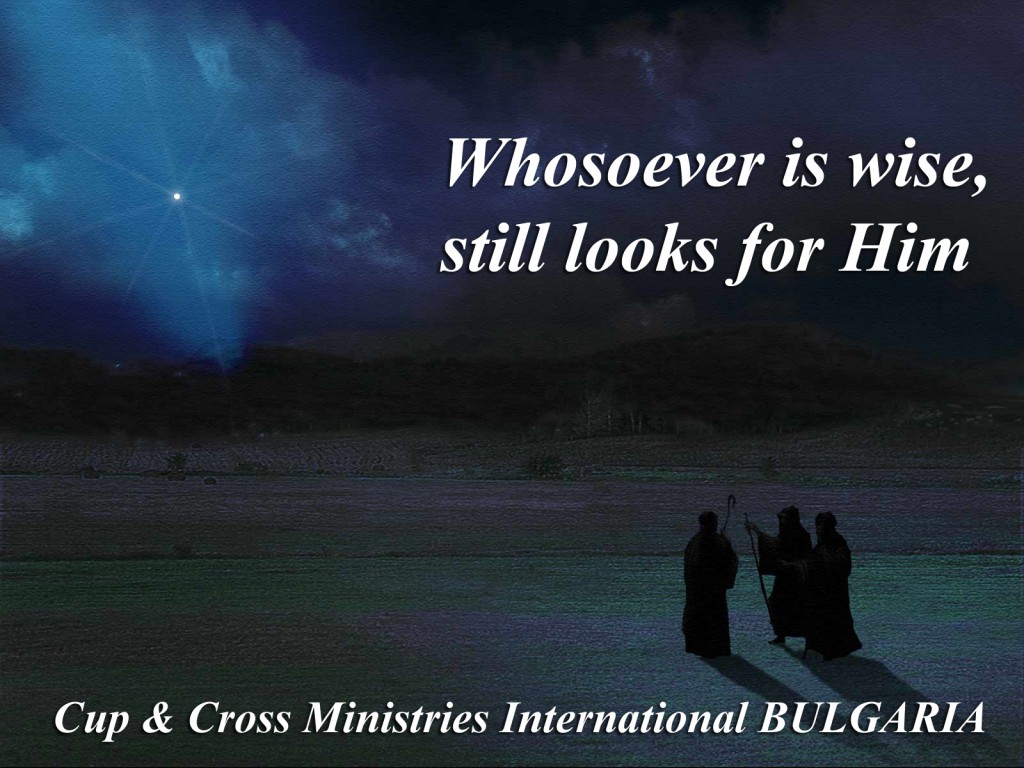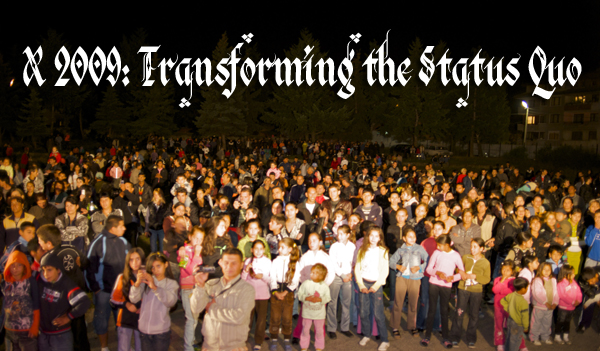Bulgarian Postcommunist Context of Ministry
Almost a decade ago, we presented a theological proposal for ministry in postcommunist countries, which has gained by far a prophetic value in our context of ministry. A strong point in the exposition was a response to the narrative, relational, spiritual paradigm often discussed in Pentecostal theology, to which our research proposed a more Eastern and more experiential model which includes prayer, persecution and power.
The thesis used this triangular formula to show that the Wesleyan quadrilateral is too logical to apply to the Pentecostal mindset and especially the Eastern Pentecostal one. Thus, it is more enforced on than emerging from the Pentecostal theology and is but a step toward understanding the Pentecostal experience.
At the same time, postmoderns relate to the spiritual mystical experiential nature of early (the research called it “primitive”) Pentecostalism, but are indifferent to a more denominational structure that marginalize the spontaneity and almost irrational unexpectancy of the Pentecostal ordus liturgia.
Applying each of the above models creates a number of dilemmas in the Bulgarian context of ministry. One of the main problems is that the Bulgarian church needs much growth before even recognizing some of the above trends. Additionally, Bulgarian clergymen have little training in distinguishing current social changes, which affect their congregations daily. Actually, in most cases there is strong negation against the relevancy of social reality on church life; almost like during the time of the Regime, when congregations were practically closed, underground communities, defined not only by the persecution against them, but by their own identity as well.
At the same time, the respective western partners of the Bulgarian evangelicals fail to properly apply their knowledge on the subject in the Bulgarian context of ministry. This inability closes like a magic circle the relationships between the said social agents and creates church crises of unprecedented magnitude, which often result in a death spiral within the community of believers. Thus, the Bulgarian church, ministering in a post communist context, continuously struggles to find its identity through which it can minister effectively in and to a postmodern world.
In the struggle where postcommunism meets postmodernity in a battle for survival and even world dominion in which, Eastern European churches become unfortunate victims on an altar where the secular antitheism and the nominal orthodoxy cross their sacrificial axes. And this cycle can be broken only when Eastern European evangelicals refuse the identities forced on them by postmodern and postcommunist (both postChristian at best) social structures, and discover their own roots in the Pentecostal identity of the Bible, the spirituality of which alone has the power to transform both postmodernity and postcommunism. And there lays the key for effective ministry among Eastern European in the 21stcentury.
M3: Mobile Power for the Ministry
After traveling almost 4,000 miles, I am finally at the 2010 BibleTech listening to Antoine’s talk on mobile technology in the ministry. Antoine is the main guy behind the Mobile Ministry Magazine and a great friend, but I am sitting in his lecture for more than just the code and the algorithm. I am a practitioner in the ministry.
Thousands of Bulgarian speaking people across the globe rely on our team every day to receive a verse from the Bible via SMS. Our Bibliata.TV website has become the Bulgarian GodTube with over 10,000 daily visitors, 1,500 active uploaders and hitting a half petabite monthly traffic in video exchange. So, I am more than just a listener – I am here for the power of the experience.
I met Antoine last year at BibleTech in Seattle. I shared with him our ministry in Bulgaria and abroad, and he offered to help us. Not long after the conference, I received in my office a Nokia 5800, which according to Antoine had more than one advantage over the iPhone, but the one that concerned me the most was the uStream app.
Speaking at the Leadership Development Institute earlier that year, I mentioned uStream but being busy with other projects never paid too much attention to it. Now, I had a reason to try it. No more than five minutes after opening the FedEx package I was broadcasting LIVE on a dozen of our ministry’s websites. Five more minutes and people were actually watching. Hundreds of them.
WOW! I stopped for a pause, because my heart was racing. The potential of one small mobile device applied to the ministry of the church was overwhelming and I needed to pray.
A week later I had convinced two Bulgarian churches to broadcast their services via uStream. Two more joined on the following Sunday, one of them being a Bulgarian speaking congregation in Chicago. A Bulgarian minister from Spain began broadcasting on Thursday nights as over 50 people were logged in and ready to watch 30 minutes before his broadcast. We then put LIVE online the annual conference of Bulgarian churches in North America. Then the Global Day of Prayer from downtown Sofia was watched by 35,000 people LIVE on our Bibliata.com website.
Before we ever returned for our ministry term in Bulgaria, we had over a dozen churches broadcasting LIVE services on Sunday alone plus additional LIVE services on every night of the week except Monday. We received hundreds of emails with testimonies of dramatic healings and life transformations. And this has been going on for over one year now. All because of a small portable telephone that can fit on the palm of my hand and travel with me oversees in the pocket of my blue jeans. I guess I can say it like this: this phone was made for preaching!
John Maxwell says that while training followers adds to your church, training leaders multiplies it. I call this the G2 effect – the growth of the church in a geometrical progression. Like the story of chess boards (2, 4, 16, 256, etc). But the use of mobile technology in the ministry multiplies its effectiveness tridimensionally, adding to it a mobile dimension as a Rubik Cube. I call it M3 – a mobile motivational ministry factor that is unprecedented. And this is something the church cannot afford to miss if it wishes to remain relevant in postmodernity.
Christmas in Bulgaria: Appreciating the Simple Things in Life
 Roasting chestnuts over an open fire and Jack Frost nipping at your nose is a comforting carol which brings many pleasant feelings around the holidays. These are two features, which are not only common to the States, but to Bulgaria as well. This is the season of chestnuts being roasted, however it is not like we picture being over a cozy fire place in a warm home. In Bulgaria it would be on the street side to sell in order to bring in some income for your family. And the Jack Frost is not just a nip for some, but it is a bone chilling cold due to not being able to afford the electric bill.
Roasting chestnuts over an open fire and Jack Frost nipping at your nose is a comforting carol which brings many pleasant feelings around the holidays. These are two features, which are not only common to the States, but to Bulgaria as well. This is the season of chestnuts being roasted, however it is not like we picture being over a cozy fire place in a warm home. In Bulgaria it would be on the street side to sell in order to bring in some income for your family. And the Jack Frost is not just a nip for some, but it is a bone chilling cold due to not being able to afford the electric bill.
For some, there will be no gift under the tree and for others there will not even be a tree. This is not said to bring you sorrow, but for you to appreciate the simple things in life. Enjoy family, friendships, a warm home, a hot meal, your health. Enjoy the time the Lord has given you and use it for his Glory and not for bickering or complaining over the small angst.
Don’t loose sight of the true meaning of Christmas. Christmas is not about the material, but it is about the spiritual. It is about the birth of our Lord and Savior even though our politically correct society wants to get ride of the “Christ” in “Christmas.” If it were not for His birth, He would not have been able to die for our sins. This remission of sin is the ultimate gift this Christmas season for it is through this act that we are able to have eternal life if we only ask.
So when you wake up on the 25th begin your day not consumed with what you didn’t get or what didn’t happen to your liking, but in silence remembering the silent and holy night over 2000 years ago. Remember those less fortunate in order not to take for granted with what you have been blessed. And most of all thank Him for His gift to you. Let these thoughts bring you comfort this holiday season.
Merry CHRISTmas 2009
From all of us in Bulgaria!
2009 X Event: Transforming the Status Quo

X youth event, which was held on September 9, 2009 in the city of Samokov near Sofia was a complete success. Six Roma worship teams from the Bulgarian Church of God with special participation of the Elley gospel band from the Central Church of God in Sofia and the worship team of Pastor Iliya Panov participated in this three hour long event, which finished with preaching and prayer provided by Cup & Cross Ministries International. Several thousand were in attendance from various parts of Bulgaria and abroad. Some pastors brought their complete congregations, others attended with family and friends, but we all gathered together ready for a new touch from God.
We named this year’s event “Transforming the Status Quo” for three reasons. First, the date 9.9.9 itself is somewhat controversial and we chose it under the leadership of the Holy Spirit to transform it from a spiritualistic superstition into a spiritual celebration. Secondly, September 9, 1944 is the date when the Communist Revolution took place in Bulgaria, and this year on this very date we asked of God to change the catastrophe of communism to the abundance of blessings for Bulgaria. And finally, our event was held in one of the largest Gipsy ghettos of Bulgaria, where thousands of Roma people were touched by the power of the Spirit.
We are truly thankful to all who partnered with us and made this event possible as part of our annually Harvest Campaign in Bulgaria. This year the Lord allowed us to create the proper environment with a professional stage and lightning, over 50kW of sound equipment, professional cameras and photography crews. The complete event was broadcasted LIVE on the internet and watched by thousands of people in Bulgaria and abroad. But most important of all, the name of the Lord Jesus Christ was lifted up above any other name at the 2009 X event in Samokov, Bulgaria.
Blue Fire
This past weekend while camping on top of the mountain of Petrohan with fellow believers, the Lord displayed his glory in many unique manifestations. Some people were baptized in the Spirit, while others received a fresh blessing with new direction for their lives. Many more were healed instantaneously, as the Lord’s presence was both glorious and gentle remaining with us throughout the night.
Saturday evening, while in prayer around one of the torches which surrounded the perimeter of the tents, the Lord revealed to me in an ever peaceful way that we are to be “Blue Fire”.
The blue fire is the part of the flame which one does not really consider when thinking about a flame. It is the element, which is at the base of the flame burning closest to the source. Therefore, the blue fire is the part with the most oxygen which allows for complete combustion. It is in this state, leaving no residue, where the flame is the purest. The blue fire is the hardest to blow out and remains light even in the strongest winds. And despite popular belief, the blue part of the flame, and not the red one, is the hottest part of the fire.
The red flame receives its color from the impurities in the air that are being combusted. These impurities absorb heat and are the cause for the red fire not being as hot as the blue fire. Since the red fire is not hot enough to reach the state of complete combustion not being close enough to the source, it leaves a soot residue, which contaminates its surroundings. And when the wind blows it does not remain strong.
We are not simply to be on fire for God with a red flame, but we are to be on fire for God with a blue flame. We are to be “Blue Fire”. We are to be the hottest and most constant of the fire. And it is in doing this that we provide true light to our surroundings and not residue. We are to remain as hot as blue fire in order to be without impurities, uncontaminated by the world. For it is the blue fire which does not to waiver in the wind; and it is the blue fire which remains as one with the source of the flame.
20 Signs of the Last Days
 1. The Spirit poured out on all flesh (Joel 2:28)
1. The Spirit poured out on all flesh (Joel 2:28)
2. Israel restored as a political state (Deuteronomy 28:64, 30:3 Jeremiah 29:14, 30:3 Isaiah)
3. Universal apostasy (2 Thessalonians 2:1-4)
4. The watering down of the gospel (2 Tim 3:5, Matthew 15:9)
5. False prophets and false Christs (Matthew 24:24)
6. Good will be called evil and evil good (Isaiah 5:20)
7. Worldly knowledge will increase (Daniel 12:4)
8. Earthquakes, floods, famines, plagues and diseases such as the world has never seen (Matthew 24 and Luke 21)
9. Peace will be taken from the earth and wars will increase throughout the world (Matthew 24 and Luke 21)
10. Wickedness, murder and crime among men, while the belief in the occult will increase (Matthew 24, Luke 21, 2 Timothy 3:1-5, 4:3-4)
11. People will not believe the signs of the Last Days (2 Peter 3:3-4; Matthew 16:1-4)
12. Increase in persecution of the Christians (Matthew 24:9; Mark 13:9)
13. Spread of Nuclear Weapons as predicted by the Bible (Isaiah 24:1; Zechariah 14:12; Matthew 24:21,22)
14. Middle East Tensions and an unified Arab league (Genesis 16:12; Psalm 83; Isaiah 2:3-4)
15. The new tower of Babel (Genesis 10; Isaiah 13:1-11; Jeremiah 50-51 Revelation 18)
16. Gog and Magog (Ezekiel 38:1-4; Revelation 20:8)
17. The Revived Roman Empire (Daniel 2:34-45; 7:7-24; Revelation 13:1-2; 17:3-16 )
18. The Anti-Christ (1 John 2:18-19; 4:3; 2 John 7)
19. The Mark of the Beast (Revelation 13:18)
20. The FINAL SIGN: The Gospel will be preached to end of the world (Matthew 24:14, Revelations 14:6-7)
Finding Friends in Phoenix or the Story of an Arizona State Quarter
 We used the time in the San Francisco Bay Area to meet up with old friends from our youth group in Bulgaria. While having coffee at the El Cerrito Starbuck’s early Sunday morning, we reminisced quite a bit remembering friends and stories from the past. Leaving the coffee shop, we came across an Arizona state quarter lying on the pavement. After picking it up, my friend shared how his brother just recently moved to Phoenix with his family.
We used the time in the San Francisco Bay Area to meet up with old friends from our youth group in Bulgaria. While having coffee at the El Cerrito Starbuck’s early Sunday morning, we reminisced quite a bit remembering friends and stories from the past. Leaving the coffee shop, we came across an Arizona state quarter lying on the pavement. After picking it up, my friend shared how his brother just recently moved to Phoenix with his family.
What Happens in Vegas is Written in Heaven
 We spent Palm Sunday together with the Bulgarian evangelical community of Las Vegas. The Bulgarian Diaspora in the most famous Nevada city has grown rapidly in the past few years now reaching several thousand immigrants who have established a prominent presence in the local community. The latest additions to the area are a Bulgarian store, a Bulgarian restaurant and of course a newspaper for the Bulgarians in Vegas.
We spent Palm Sunday together with the Bulgarian evangelical community of Las Vegas. The Bulgarian Diaspora in the most famous Nevada city has grown rapidly in the past few years now reaching several thousand immigrants who have established a prominent presence in the local community. The latest additions to the area are a Bulgarian store, a Bulgarian restaurant and of course a newspaper for the Bulgarians in Vegas.
Naturally, an evangelical church is being formed in the existing Bulgarian community. These are not only people who have ties with the evangelical churches in Bulgaria, but their families and representatives of second generation immigrants as well.
We were blessed to receive a cordial invitation to minister to them on our way back from the West Coast. Arriving in town, we held a Bible study on Friday and then preached at the beautiful Palm Sunday service organized by the Bulgarian evangelical believers of Las Vegas. As we prayed with the people for the remaining of the warm Sunday evening, preaching Salvation in Sin City became more than a slogan. This world claims that “What happens in Vegas stays in Vegas”, but what happened in the Bulgarian evangelical church in Vegas on Palm Sunday is written in Heaven.
PRAYER for the POMAKS of BULGARIA
 This urgent report is based on the resent proposal for changes within the legal status of the Muslim mosques on the territory of Bulgaria. The controversial changes may allow even Muslim temples which are protected as buildings of historical value to be reactivated and used again for service. This will inevitably affect the Muslim community on the Balkan Peninsula, as well as the Bulgarian Pomaks – a Bulgarian-speaking Muslim population group native to southern Bulgaria. The building of Muslim mosques on the territory of Bulgaria has been revitalized in the past decade, especially in the villages in Southern Bulgaria where Pomaks live.
This urgent report is based on the resent proposal for changes within the legal status of the Muslim mosques on the territory of Bulgaria. The controversial changes may allow even Muslim temples which are protected as buildings of historical value to be reactivated and used again for service. This will inevitably affect the Muslim community on the Balkan Peninsula, as well as the Bulgarian Pomaks – a Bulgarian-speaking Muslim population group native to southern Bulgaria. The building of Muslim mosques on the territory of Bulgaria has been revitalized in the past decade, especially in the villages in Southern Bulgaria where Pomaks live.
8 Simple Rules for Doing Missions in the Spirit
1. Never put a price on the human soul, which you are not willing to put on your own.
2. Unsubscribing from missions’ newsletters may result in unsubscribing from the missional letter of God.
3. By no means raise an offering because a missionary needs it, do so because it’s needed for the survival of the church.
4. Not giving to missions is far better, than committing to give without any intention to do so.
5. Before using a missions’ offering to pay a church bill, think of whose offering a missionary should use to pay their bill.
6. Don’t wait on a missionary to ask you for what God has already commanded you to give.
7. Pray for missionaries without ceasing. For it could be your prayer that saves a soul.
8. Never delay sending a missions offering for tomorrow. After all, it was you who preached that tomorrow may be when the Lord comes back.










